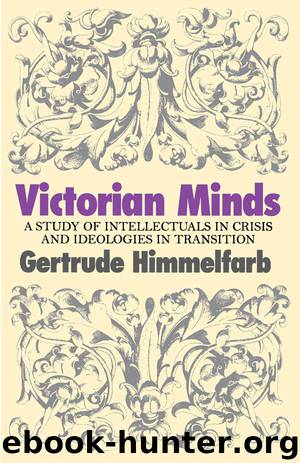Victorian Minds by Gertrude Himmelfarb

Author:Gertrude Himmelfarb [Himmelfarb, Gertrude]
Language: eng
Format: epub
Publisher: Ivan R. Dee
Published: 1995-02-01T00:00:00+00:00
One of the peculiarities of the English intellectual qua gentleman, which may account for his natural, artless manner, is the survival of the schoolboy in him. That Leslie Stephen was a product of Eton and Cambridge was one of the primary facts of his intellectual life. He had been sent to Eton when his mother, observing in him what she took to be evidence of precocious genius, consulted a physician, who diagnosed the boy’s condition as the symptoms of a “disordered circulation,” and prescribed a school where he could be assured of “fresh air, humdrum lessons, and a rigorous abstinence from poetry.”5 Eton, evidently, met that prescription.
It is not the mere convention of the biographer that makes it mandatory to inquire into an Englishman’s schooldays. Nor is it accident that the English have produced the largest literature of memoirs devoted to this subject. More than any other single factor—more than childhood, marriage, or profession—school seems to constitute the decisive, formative influence in their lives, an influence that acquires the character of a permanent emotional, social, even metaphysical condition. It is, in fact, the only relation to the metaphysical that many Englishmen experience. Thus the differences between a Leslie Stephen and a Matthew Arnold, for example, can perhaps best be understood in terms of their distinctive genera: Eton-Cambridge and Rugby-Oxford.
At Eton, as Stephen was fond of recalling, there was none of the “cant” about Christian behavior or Christian gentlemen so common at Rugby, none of the moralizing sermons to which Dr. Arnold was addicted. No one at Eton pretended that religion had anything to do with the schoolboy’s life of cribbing, lying, cheating, stealing, and bullying. The old fossil droning on in the college chapel about the duties of the married state did not think the subject inappropriate because he did not assume that sermons were meant to be taken seriously. Religion, as distinct from the mere social activity of churchgoing, was a private affair.
Religion was a private affair, partly at least for the reason that science was so much a public affair. It was in the fifties, while Stephen was at Cambridge, that the Mosaic account of creation began to be seriously undermined, on the one side from geology and zoology, with their revelations about the antiquity of the universe and the evolution of species, and on the other from the recently imported “Biblical Criticism” of Germany. Many of the bright young men in these middle years of Victoria’s reign discovered that they could no longer subscribe to the dogmas of the Anglican Church or any other church. Those of the Rugby-Oxford temperament, like Matthew Arnold’s friend, Arthur Clough, went through agonies of doubt and emerged to find their familiar world shattered. Others, generally the more sanguine products of Eton or Cambridge, experienced nothing more disturbing than the sensation of having awakened. Stephen, as he later testified, did not lose his faith; he simply awoke to the realization that he had none. A professional intellectual, he managed to live through one of the greatest intellectual revolutions of modern times, without truly experiencing it.
Download
This site does not store any files on its server. We only index and link to content provided by other sites. Please contact the content providers to delete copyright contents if any and email us, we'll remove relevant links or contents immediately.
| Africa | Americas |
| Arctic & Antarctica | Asia |
| Australia & Oceania | Europe |
| Middle East | Russia |
| United States | World |
| Ancient Civilizations | Military |
| Historical Study & Educational Resources |
Room 212 by Kate Stewart(5101)
The Crown by Robert Lacey(4796)
Endurance: Shackleton's Incredible Voyage by Alfred Lansing(4747)
The Iron Duke by The Iron Duke(4344)
The Rape of Nanking by Iris Chang(4193)
Joan of Arc by Mary Gordon(4088)
Killing England by Bill O'Reilly(3989)
Say Nothing by Patrick Radden Keefe(3972)
I'll Give You the Sun by Jandy Nelson(3424)
Shadow of Night by Deborah Harkness(3350)
Hitler's Monsters by Eric Kurlander(3324)
Mary, Queen of Scots, and the Murder of Lord Darnley by Alison Weir(3194)
Blood and Sand by Alex Von Tunzelmann(3186)
Eleanor & Park by Rainbow Rowell(3145)
Darkest Hour by Anthony McCarten(3115)
Margaret Thatcher: The Autobiography by Thatcher Margaret(3071)
Book of Life by Deborah Harkness(2919)
Red Famine: Stalin's War on Ukraine by Anne Applebaum(2914)
The One Memory of Flora Banks by Emily Barr(2851)
